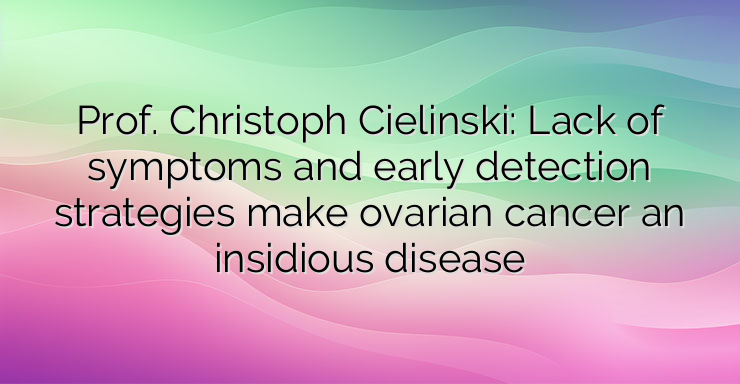Univ. Prof. Dr. Dr. Hon. cause Christoph Cielinski was included by Stanford University in the top 2% of the best scientists in the world in 2021 and is one of the leading oncologists in Europe. He is the head of the Academy Cancer Center. In his long career, Prof. Dr. Cilinski headed the Department of Medicine and its Clinical Division of Oncology, and was subsequently Chairman of the Interdisciplinary Cancer Center at the General Hospital of the Medical University of Vienna, as well as a member of the Scientific Committee of the Vienna oncology center. He is the author of a number of books and over 600 publications and reviews in prestigious scientific journals. His h-index is 72, with citations from his publications exceeding 23,000. He is also editor-in-chief of ESMO – the largest European oncology association. – What should we know about ovarian cancer? Does it spread to other organs? Ovarian cancer is a malignant disease of the ovaries. The disease can be genetically determined or occur spontaneously. Such genetic predispositions can occur in families where there is a cumulation of ovarian and/or breast cancer and can be detected by appropriate investigations. The frequency of the disease increases with age. The rate of new cases of ovarian cancer is approximately 10.9 per 100,000 women per year, and a woman’s lifetime risk of developing ovarian cancer is 1 in 78, while the risk of dying from it is 1 in 108. Death occurs because spread to other organs, mainly – but not exclusively – within the abdominal cavity, including the omentum, lymph nodes and liver. Other sites include the pleura and may also involve the lungs. – Does ovarian cancer have symptoms in its early stages? Unfortunately not, and therefore early recognition is quite uncommon. When symptoms do occur, they are mainly associated with abdominal distension or – at a later stage – an increase in abdominal volume due to fluid production. The lack of symptoms and early detection strategies make ovarian cancer such an insidious disease. – Should both ovaries be removed? Definitely. And not only both ovaries, but also the fallopian tubes. Ovarian cancer surgery is a serious undertaking and should therefore only be performed in experienced centers. – What are the chances of an ovarian cyst being cancerous? Ovarian cysts can have malignant characteristics, but, of course, very often they are physiological and due to ovulation. Therefore, the diagnosis can only be made by experienced gynecologists. – How fast can an ovarian tumor grow? Ovarian cancer grows quickly, making the disease even more difficult to diagnose early. – What are the treatment options? Surgery, chemotherapy, radiotherapy, targeted therapy, hormone therapy… Surgery is in most cases the first step to be taken. Then we usually administer chemotherapy,which is often given together with an immunotherapy called bevacizumab. After treatment for about 4-5 months with chemotherapy, except in very advanced stage cases, the patient is monitored at regular intervals for recurrences by blood tests and CT scans. – Can this treatment have an impact on sex life? If so, how and for how long? Except for surgical consequences, it is usually not directly affected. – Does the treatment affect fertility? Of course, with removal of the ovaries, fertility cannot be preserved. – What are the signs that could suggest that ovarian cancer has recurred? Usually, patients after ovarian cancer are followed up very carefully. Thus, recurrences are diagnosed during such follow-up programs and are manifested by an increase in the typical tumor marker in the serum and/or by changes in CT studies. – Is there any way to prevent ovarian cancer? There is data showing that the incidence of ovarian cancer is lower among women taking birth control pills. Otherwise, I’m afraid I can’t give any advice.


Leave a Reply